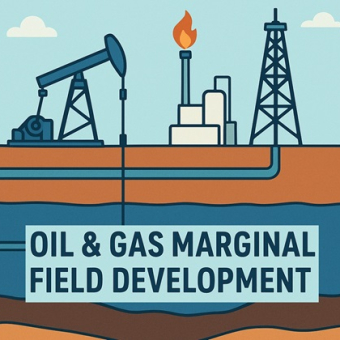- Selamat datang di website PT Fiqry Jaya Manunggal. Semoga anda senantiasa sehat afiat. Kami siap melayani anda
Gas Development and Commercialization
Rp 7.950.000| Stok | Tersedia |
| Kategori | Oil & Gas, Training |
Instructor: Ir. Sudhiharto, MT
Gas Development and Commercialization
BACKGROUND:
Natural gas has become an increasingly important energy source. Successful Gas Development and Commercialization demands careful integration of technical, economic, regulatory, and commercial considerations to ensure profitability and sustainability. Not only a cleaner alternative to coal and oil but also as a strategic commodity in the global energy market. Developing gas field requires a comprehensive understanding of the entire value chain from subsurface resource evaluation to commercialization.
Gas industry operates under a regulatory framework that mandates compliance with local PSC, environmental regulations, and domestic market obligations. Therefore, professionals in this sector must master both the technical aspects of gas development and the commercial strategies. Since a gas field required to negotiate sales, secure transportation, and deliver gas to end users efficiently. This training will equip participants with the essential knowledge and skills to navigate these complexities effectively.
OBJECTIVES:
• Understand the key stages in gas field development from exploration to production.
• Apply basic reserves calculation methods for gas resources.
• Identify the major components and processes in gas processing and surface facilities.
• Understand gas transportation methods, infrastructure, and storage systems.
• Explore marketing strategies, pricing mechanisms, and negotiation practices in gas sales.
• Analyze Gas Sales Agreements (GSA) and identify key commercial terms.
• Integrate technical and commercial factors for effective gas development planning.
Recommended Participants
• Gas field development engineers.
• Reservoir and production engineers.
• Project managers in oil and gas development.
• Commercial and marketing managers in the gas sector.
• Legal professionals involved in energy contracts.
• Government and regulatory agency representatives.
Course Outline
Subsurface & Reserves Calculation:
• Overview of the natural gas industry and value chain.
• Subsurface characterization and reservoir evaluation.
• Methods for gas reserves estimation (Volumetric, Material Balance, Decline Curve).
• Classification of reserves (1P, 2P, 3P) and resources (contingent, prospective).
• Regulatory requirements for reserves reporting in Indonesia.
Gas Processing & Surface Facilities / Transportation & Storage:
• Gas processing fundamentals: separation, dehydration, sweetening, NGL recovery.
• Design and operation of surface facilities for gas treatment.
• Gas compression and metering systems.
• Transportation infrastructure: pipelines, LNG, CNG.
• Gas storage methods and strategic reserves.
• Safety and environmental considerations in gas facilities and transport.
Gas Sales, Marketing & GSA:
• Gas market fundamentals and demand analysis.
• Pricing mechanisms: oil-indexed, hub-based, hybrid models.
• Marketing strategies for domestic and export markets.
• Gas Sales Agreement (GSA): structure, key clauses, and negotiation tips.
• Case studies of successful gas commercialization projects.
• Group exercise: integrating technical and commercial considerations into a gas development plan.
About The Course Leader
Gas Development and Commercialization

Asset Integrity Management System (AIMS)
BACKGROUND: Asset Integrity Management Systems (AIMS) outline the ability of an asset to perform its required function effectively and efficiently whilst protecting health, safety and the environment and the means of ensuring that the people, systems, processes and resources that deliver integrity are in place, in use and will perform when required over the whole…
Rp 7.950.000
Petroleum Engineering for non Petroleum Engineer
BACKGROUND: Training Petroleum Engineering for Non-Engineering merupakan salah satu pelatihan bidang kompetensi untuk sektor minyak dan gas yang sangat direkomendasikan diikuti oleh para pekerja pada sektor minyak dan gas dengan latar belakang non-engineering. Dalam pelatihan ini akan dibahas dasar-dasar dalam teknologi pengolahan minyak dan gas dan mampu melakukan analisa-analisa serta prinsip dasar dalam pengolahan data…
Rp 7.950.000
Slagging and Fouling Phenomena
Background Slagging dan fouling adalah tantangan operasional yang signifikan bagi tim operasi di pembangkit listrik yang menggunakan batubara sebagai bahan bakar. Pengembangan kompetensi tim operasi sangat penting untuk memastikan bahwa mereka memahami dasar-dasar fenomena ini, serta mampu memprediksi, mencegah, dan memitigasi dampaknya. Pelatihan ini akan membantu meningkatkan keahlian dalam mengelola masalah slagging dan fouling yang…
Rp 13.950.000
Wells Performance & Surveillance
BACKGROUND: Effective monitoring and surveillance of well performance are critical to optimizing production, identifying operational inefficiencies, and maintaining the integrity of wells over time. Wells Performance & Surveillance is a comprehensive approach that involves the collection, analysis, and interpretation of data from wells to improve performance and decision-making. This training provides participants with the knowledge…
Rp 13.950.000
Oil & Gas Contract Management: Analysis of the Various Types of Production Sharing Agreement
BACKGROUND: Industri minyak dan gas bumi merupakan sektor strategis yang menghadirkan tantangan besar dalam pengelolaan kontrak. Production Sharing Contract (PSC) adalah salah satu bentuk kontrak yang sering digunakan dalam kerja sama antara pemerintah dan perusahaan minyak serta gas bumi (Oil & Gas Contract Management). PSC dirancang untuk memastikan pembagian keuntungan yang adil sekaligus mempromosikan investasi…
Rp 14.500.000
Marginal Fields Development
Background: Marginal fields development refers to discoveries which have not been exploited for long, due to one or more of the following factors: • Very small sizes of reserves/pool to the extent of not being economically viable • Lack of infrastructure in the vicinity and profitable consumers • Prohibitive development costs, fiscal levies and or…
*Harga Hubungi CS
